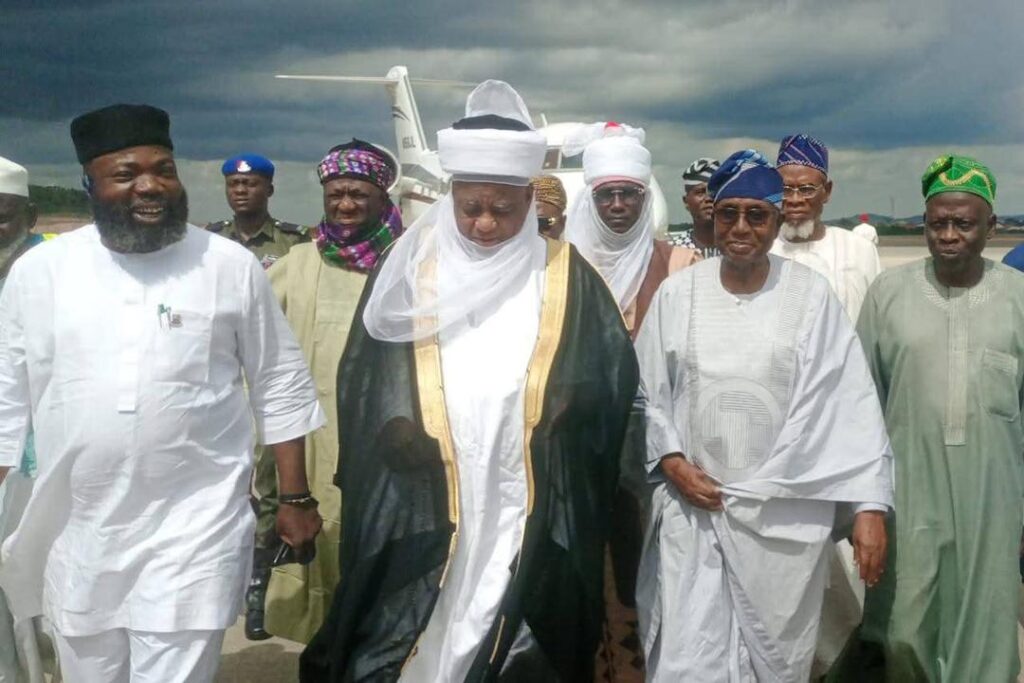
The ancient city of Ibadan came alive on Friday as the Sultan of Sokoto, Alhaji Muhammadu Sa’ad Abubakar III, arrived to participate in the historic coronation of Oba Rasheed Adewolu Ladoja as the 44th Olubadan of Ibadanland.
The Sultan was received at the city’s entrance by Oyo State Commissioner for Works, Alhaji Mojeed Mogbonjubola, senior government officials, and representatives of the Nigerian Supreme Council for Islamic Affairs (NSCIA). He was accompanied by traditional aides, eminent Muslim leaders, and dignitaries from Sokoto, symbolizing the strong cultural and spiritual ties between northern and southwestern Nigeria.
Speaking shortly after his arrival, the Sultan described the coronation as “a celebration of unity, heritage, and leadership,” emphasizing that his presence was also a reaffirmation of the long-standing relationship between the traditional institutions of Sokoto and Ibadan.
A Historic Throne
The Olubadan stool is one of the most revered traditional thrones in Yoruba land, with a history dating back to the 16th century. Unlike many monarchies in Nigeria, succession to the Olubadan throne follows a unique and orderly system, rotating between two lines — the Otun and the Balogun. This has long been praised as one of the most peaceful succession processes among Yoruba traditional institutions, reducing disputes and maintaining continuity.
Oba Rasheed Adewolu Ladoja, a former governor of Oyo State, now ascends the throne as the 44th Olubadan, succeeding the late Oba Lekan Balogun, who passed away earlier this year. His coronation is not only a landmark event for Ibadan indigenes but also a moment of cultural pride for the Yoruba nation.
National Significance
The Sultan’s presence underscores the importance of inter-regional solidarity in Nigeria’s traditional leadership. Historically, the Sultan of Sokoto, as the spiritual leader of Muslims in Nigeria, has maintained cordial relations with Yoruba monarchs, including the Ooni of Ife, the Alaafin of Oyo, and successive Olubadans. His participation in the Ibadan coronation is widely seen as a gesture of unity at a time when the nation is grappling with political, ethnic, and religious tensions.
Observers say the gathering of traditional rulers and dignitaries from across Nigeria in Ibadan reflects a renewed call for cultural diplomacy — the use of heritage and traditional institutions to foster national harmony.
Celebration Across Ibadan
Across the city, residents turned out in large numbers to witness the colorful displays that marked the coronation. Drummers, masqueraders, cultural troupes, and palace chiefs in resplendent traditional attire added grandeur to the event. Roads leading to Mapo Hall and the Olubadan Palace were filled with jubilant crowds eager to witness history.
Political leaders, captains of industry, religious clerics, and diplomats are also expected to join the festivities, further elevating the coronation to a national event.
For Ibadan, the installation of Oba Ladoja marks a new chapter in its storied history as one of the largest indigenous cities in West Africa. For Nigeria, it is yet another reminder that its unity can be strengthened through shared traditions, mutual respect, and cultural pride.
